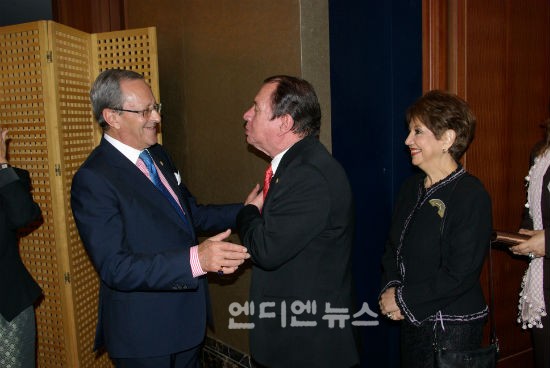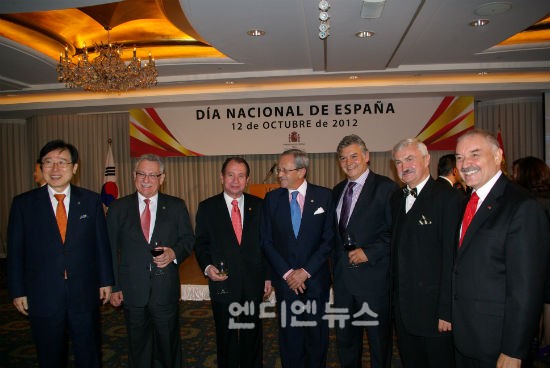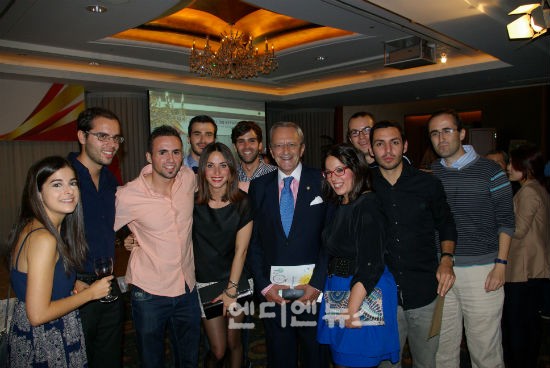“Amb. Arias-Romero clarifies Spain’s willingness to overcome current financial crisis”
“I am firmly confident that Spain will overcome current financial crisis”. Amb. Luis Arias-Romero of Spain elaborated on world economic crisis, in particular economic crisis in Europe and Spain among others, and major accomplishments in terms of bilateral exchange between Korea and Spain last year in his speech to commemorate the 2012 Spain National Day, held on Oct. 12, 2012 at the downtown Lotte Hotel, Seoul.
 |
||
| ▲ Amb. Arias-Romero welcomes Amb. Manuel Lopez Trigo of Costa Rica and his spouse at the reception line. | ||
By focusing on economic crisis instead of usual National Day comments, Amb. Arias-Romero clarified Spain’s willingness to overcome current financial crisis, garnering many sympathy from the participants including the Seoul Diplomatic Corps who included large Europe circle envoys and Middle & South America ambassadors besides Amb. Vitali V. Fen of Uzbekistan who serves as dean of the Seoul Diplomatic Corps.
The following is a speech, delivered by His Excellency Luis Arias-Romero on the occasion of the Spain National Day. –Ed.
Honourable Members of the National Assembly,
Your Excellencies,
Representatives of the Government,
Spanish friends,
Colleagues and collaborators of the Spanish Embassy in Seoul,
Ladies and Gentleman,
Very good evening. I would like to thank and welcome you here today on the occasion of the National Day of Spain the 12th of October.
Ladies and Gentlemen:
I know it is usual to begin in an Ambassador’s speech of the national day, a list of all the past, present, and future achievements concerning bilateral relations.
However, today, if you don’t mind, I would like to slightly change the approach and focus, first of all, on the international economic crisis and more particularly on the European one and that affecting my country. As a second major topic, I would like to outline the main achievements that could be highlighted in our bilateral relations with the Republic of Korea over the past year.
 |
||
| ▲ Amb. Arias-Romero (fourth from right) poses with colleague envoys to commemorate the 2012 Spain National Day after the speech. | ||
Ladies and Gentlemen:
To a greater or lesser extent, directly or indirectly, the world’s economy is going through an economic upheaval without precedents in the past ninety years.
In several countries of the Eurozone, the current situation shows a special seriousness, as it happens in my country. The reasons of this financial turmoil are diverse. Some of them, and not the less important ones, have their origin out of Europe. Others inside of Europe, and of course, some are specific of each country, in the case of Spain, it was the “boom” of the construction sector improperly over-sized during the last twenty years.
In Spain we are very much aware of the seriousness of this matter and the need of taking the appropriate measures - strict and even difficult measures - not only to face this situation, but most importantly, not to commit the same mistakes in the future again.
However, the general awareness that we are facing a very serious problem and, the strength of the existing parliamentary majority allows my government to push forward economic reforms of structural and fiscal nature in a prospect of stability. It is there where, in a consecutive or simultaneous way, but without interruptions, we are implementing the following measures:
- A thorough reform of our financial system and a rational recapitalization of our banks.
- We are working very hard on the fiscal consolidation even though there has already been taken very tough measures such as the cut back of civil servants or the increase of the VAT.
- Similarly, reforms of the labour market as well as the deregulation of many activities in the service sector.
The reforms I have been referring to as an example, have its reflection also in the European Union, to which we are part of and particularly active 27 years ago, has adopted decisions of great significance to overcome the crisis and to improve the governance of the Economic and Monetary Union. It is clear the crisis affecting the sovereign debt and the weakness of the financial system, combined with low growth and existing macroeconomic imbalances, has slowed down economic growth and questioned the stability of this institution.
The decisions taken in recent European Councils clearly underline, however, the strong political will to deepen further on banking and fiscal union adopting the appropriate tools such as the “Stability and Growth Pact”, the increasing supervision power of the European Central Bank, a greater degree of control when presenting the General State Budget or the recent commitment assumed through the entering into force of the European Stability Mechanism, which has a fund of more than 500.000 million euros in order to ensure financial stability in the Eurozone.
The implementation in practice of these measures will contribute, within a reasonable time, to promote once again economic growth in Europe, job creation, and more investment, making the European Union even more competitive.
Ladies and Gentleman,
Spain does not start anew. Let there be no mistake. We are the fourth largest economy in the Eurozone, and we are based on very well established components: diversified economy, skilled labour and multinational companies operating all over the world.
Just to give some examples I will remind you that our companies are world leaders in key sectors as renewable energies, infrastructure management, biotechnology or high-speed network. We are the tenth largest investor in the world and second in Latin America. Generally speaking, Spanish foreign direct investment (FDI) stock is higher than 600 billions dollars.
To conclude these brief examples I recall the tourism sector: Spain is the second major destination worldwide receiving between 67 to 70 million tourists every year.
So, do we have crisis?
Yes, and a very serious one.
Do we have security and faith in our future?
Absolutely, with the conviction that we will emerge from it strengthened as well as the European Union as a whole.
Ladies and Gentleman:
We celebrate this year our 62nd Anniversary of the establishment of diplomatic relations between Spain and the Republic of Korea.
Throughout this year our relationship has continued strenghtening and developing in political, economic and cultural terms despite the global crisis background I have been referring to.
The visit to Seoul of the Spanish President, Mr. Mariano Rajoy Brey, March 26th, was his first one accomplished to an Asian country, just three months after assuming his responsabilities as President. His meeting with President Lee Myung Bak, March 28th, was a landmark in our strategic relationship.
In terms of economic relationship the data are very positive, largely thanks to the entry into force of the FTA between the EU and the Republic of Korea, which, as many of you remember, was one of the highest priorities during the Spanish Presidency of the EU in the first half of 2010. Thus:
- Between January and July of 2012 a trade exchange amount of 3.5 trillion Won has been scored.
- Spanish exports to Korea in this period increased 18.2% compared with the same period in 2011. Traditional products such as wine, olive oil or pork products, maintain a positive development. Although, the real engine for the growth of our exports is technology, machinery and industrial production.
At this juncture, it is worth remembering that more than 3.000 Spanish companies of different sizes and identities have participated and are actively participating in this growing exchange flow. Besides, just three months before the end of the year, the Economic and Commercial Office of the Spanish Embassy has processed more than 100 trade related visits to Korea.
Under the heading of investments, a special reference should be made to the agreement reached between the Spanish company BEFESA-ABENGOA and the Korean company Hankook & RM to recycle solid wastes – steel powder - in the Republic of Korea. It supposes a Spanish investment of 90 billions won which introduces SDHL technology used by ABENGOA in its manufacturing plants in Germany, France, Sweden and Turkey, which implies the immediate acquisition of 55% of Hankook capital. This agreement opens a new chapter and a very significant partnership between Spain and Korea in the industrial waste processing and management field.
On the other hand, SK Lubricants, on July of this year, has announced a joint venture with REPSOL, for the construction of a lubricant plant in Cartagena, next to the refinery of Escombreras, which will be operational by the end of 2014. SK contributes 70% of the capital and REPSOL the remaining 30% and it will be one of the largest manufacturers of lubricants in all Europe.
 |
||
| ▲ Amb. Arias-Romero posing with Spain community in Korea during the reception. | ||
Are we happy with these results?
Yes.
Are we, Spaniards and Koreans, satisfied with these numbers?
Definitely not.
These results, even though they represent a significant and sustained increase compared to previous years, are still far from the potential of the economic interaction that can be expected from two countries like ours. Hence, we continue working on solid foundations such as engineering, environment, renewable energies, etc, in order to achieve proportional goals according to the size of both of our economies.
We still have work to be done.
Last but not least, in the context of our bilateral economic relationship, I should also mention that during this year, more than 100.000 tourists from the Republic of Korea have travelled to Spain. The number of Korean tourists to Spain has exactly tenfold throughout last 10 years.
Similarly, an increasing number of tourists from Spain are visiting the Republic of Korea on a yearly basis, as a result of the intense and fruitful efforts of the Korean Government to make the country known beyond its borders.
Spain and Korea are aware that the deeper knowledge of many of our citizens is the basis for the strengthening of our already excellent relationship.
As regards Defense, collaborative efforts between Spain and Korea cover a wide range of great interest such as Basic, Secondary, Higher and Advanced Army Studies, including the Agreement on Military Cooperation. Likewise, within the context of the aerospace industry development collaboration which reflects a substantial and long standing contribution, I also would like to mention that in the framework of the Republic of Korea Air Force, ROKAF F-X Programme, our Eurofighter industry is willing to transfer the relevant technologies to support the development of the KF-X the new Korea indigenous Fighter project as well as those for the New Regional Transport Aircraft, among others.
The Eurofighter programme will enable Korea, in addition to the first-rate technological transfer, to participate as a full member in a further development of the programme, encouraging many sectors of its economy.
From a cultural point of view, closer relations among our countries continue being pursued by leaps and bounds, and thus are more and even better the Spanish proposals present in the Korean cultural scene ranging from cinema to photography and from classical music to flamenco, with a special mention to the Spanish Pavilion at Yeosu 2012 International Exposition which ended its participation with more than half a million visitors.
Moreover, as a core part of our work, the dissemination of the Spanish language and culture we share equally with the Latin-American countries, continues to be strengthened, and this is reflected on the number of candidates for DELE (Diploma of Spanish as a Foreign Language) which is organized by Aula Cervantes every year. In 2012, the number of candidates will exceed, for the first time, 2.000 candidates per year.
Finally, I would also like to highlight the current academic cooperation which is excellent and, especially, students and teachers exchanges that are taking place as is attested by the number of Spanish university students who join us today and who undoubtedly will be the best Korean hospitality messengers upon their return to Spain.
It is precisely to you, the younger people, whom I particularly address this message that is about to come to an end, because, more than anyone else, you are the ones who will continue deepening the relations among our countries, identifying, from your respective future activities, the common ground and strengths that undoubtedly bind Korea and Spain, Spain and Korea.
Thank you for your attention and patience.
I would like now to propose a toast to the President of the Republic of Korea, to His Majesty the King, and to the welfare and prosperity of the people of our two countries.

